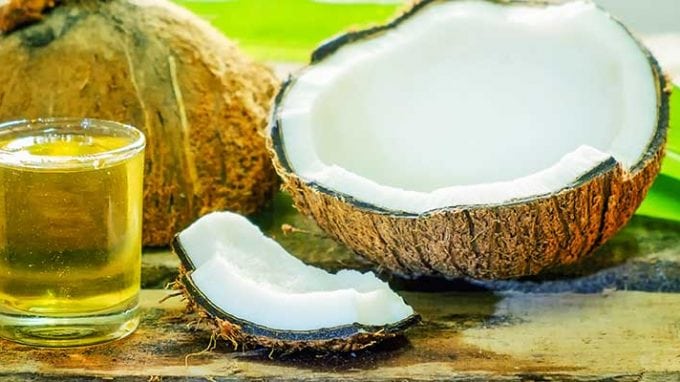Coconut oil is a healthy source of fat that helps the endocrine system, boosts fertility and can facilitate conception and breastfeeding.
Coconuts are a controversial food. While they are almost entirely saturated fat, the majority of this fat consists of medium-chain fatty acids (MCFAs) that are easily used by the body and don’t negatively impact cholesterol levels. The oil is also a source of capric, caprylic and lauric acids, which are antiviral, antifungal and antibacterial. The combination of healthy MCFAs and natural antimicrobial properties make this oil excellent as a fertility aid.
Hormones and Coconut Oil

Antimicrobial Fatty Acids
The genital environment is host to many strains of bacteria, fungi and viruses. Sometimes, stress, other health conditions or medication can throw this balance off. Coconuts are an abundant source of capric and caprylic acids and using them topically helps kill pathogenic microbes and maintain a healthy skin environment. Healthy genital mucosa improves lubrication and makes conception easier.
MCFAs and Blood Sugar
The medium-chain fatty acids found in coconut fats are easily taken up and used by the body. This means that they’re a ready source of energy, which helps maintain stable blood sugar levels and avoid the sugar highs and lows that lead to snacking. Maintaining stable blood sugar and a healthy weight is vital to fertility, as high blood sugar may lead to DNA damage in sperm and problems with embryo implantation. For those with gestational diabetes, keeping blood sugar within a healthy range is vital for a safe pregnancy.
Lauric Acid and Breast Milk
Lauric acid is another antimicrobial fatty acid. It is present in both coconuts and breast milk and can help support the immune function of breastfeeding newborns. Consuming coconut while breastfeeding helps ensure that adequate lauric acid reaches the baby, while using coconut oil specifically helps maintain energy levels and provides sufficient calories for an adequate milk supply.
As with many other dietary ingredients, balance is the key. While coconut may be largely saturated fat, this doesn’t automatically make it unhealthy. Everybody responds differently to different diets and the length of fatty acid chains has an impact on how the fat is metabolized and what impact it will have on blood lipids. For people who are pregnant or trying to conceive, adding coconut to the diet and using it topically is an excellent way to get enough saturated fat, provide a healthy microbial environment during conception, keep energy levels stable and give newborns a boost in immunity.




